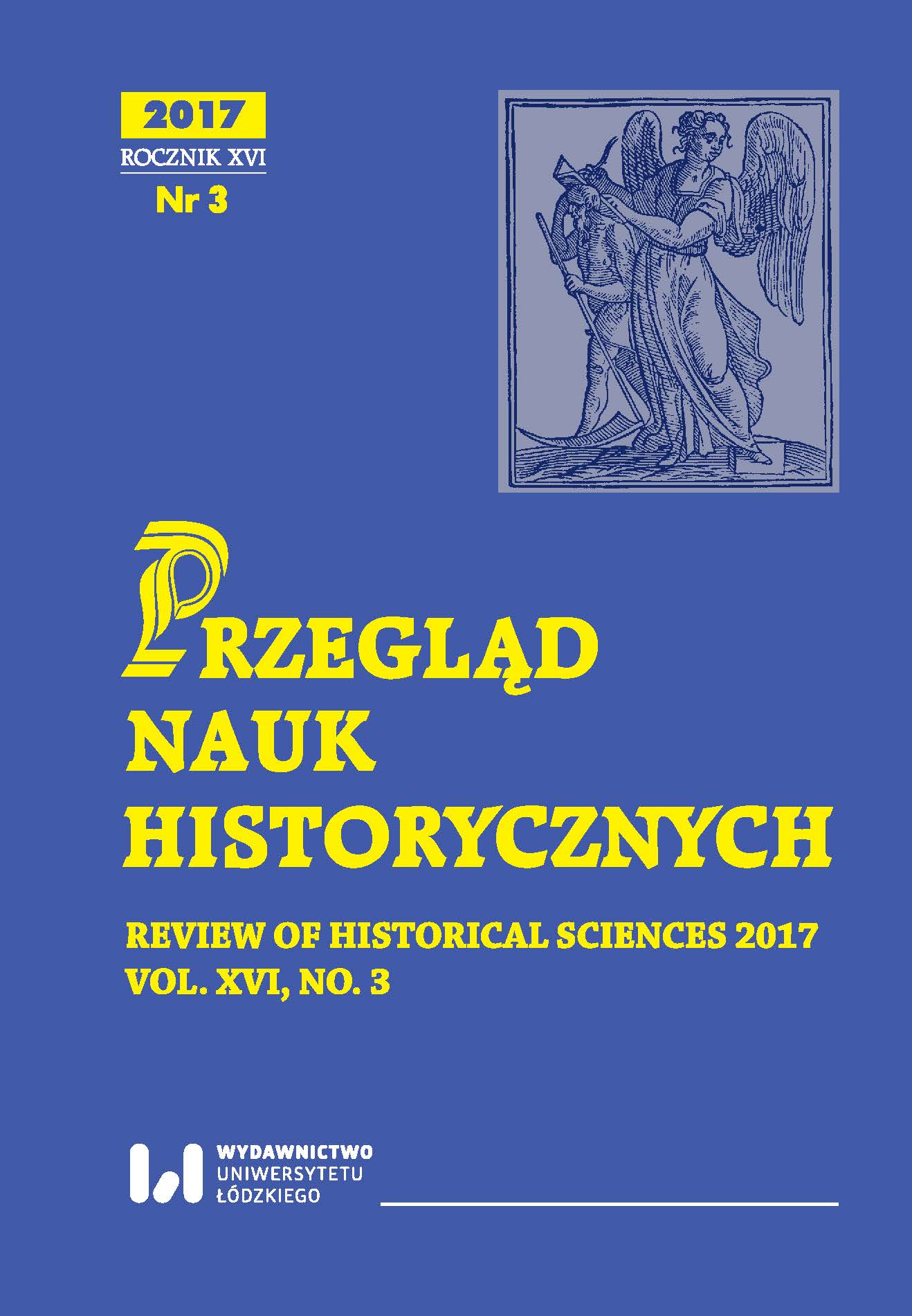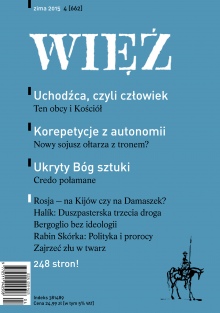
We kindly inform you that, as long as the subject affiliation of our 300.000+ articles is in progress, you might get unsufficient or no results on your third level or second level search. In this case, please broaden your search criteria.


Jan Skórzyński, Krótka historia Solidarności 1980–1989, Europejskie Centrum Solidarności, Gdańsk 2014, 190 s.
More...
Andrzej Friszke, Między wojną a więzieniem 1945—1953. Młoda inteligencja katolicka, Wydawnictwo „Więź”, 416 s.
More...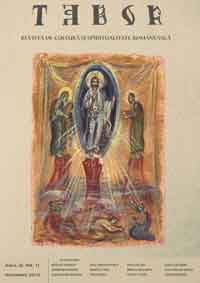
The first four decades of the twentieth century represented the period with the most radical transformations that Europe had ever experienced. The metamorphosis – whether political, economical, cultural, ethnical or scientific – was often extreme, radical and profound. Social sciences were no exception, being usually involved in the front line among the determining factors of change. The new political, economical and social systems benefitted from the ideological support that these sciences could eventually put into practice. This was also the case of interwar Romania, where the ideological movements were a constant source of friction and rupture between the various segments of society. Historians, philosophers, theologians and men of letters were involved in a confrontation with clear political and social connotations. Each side was claiming the supremacy, superiority and importance of their vision, demonizing any opposing attitude. One of the Romanian key figures of this period was Dimitrie Gusti. As a philosopher, sociologist and professor of ethics, Gusti founded the Romanian Sociological School and the Romanian Social Institute together with other numerous scientific institutions from Romania. As a student and disciple of key figures in the study of social sciences such as Emil Durkheim and W. Wundt, Dimitrie Gusti was an adherent of multidisciplinary monographs regarding rural communities. Thus, with the support of King Carol II of Romania, he developed a pioneering project between 1925 and 1948 concerning the systematic research of the Romanian villages, which remained an unfinished work due to the installation of the communist regime. His pioneering research was doubled by the completion of a video monography, whereby the most important aspects of rural Romanian life were revealed. Gusti’s endeavours were not entirely scientific, being mostly aimed at implementing a much vaster political and social vision. During the authoritarian regime of King Carol II, Europe was the campsite of strong radical movements: fascism, nazism and communism. The Romanian Legionary Movement promoted an extreme nationalism based on fundamental values such as mother country, orthodoxy, antisemitism, appeal for popular traditions. Extremely influent among the young, a part of the intellectuals, the clergy and the peasantry, the legionaries entered an ideological conflict with the regime of Carol II. Thus, the monarch assumed the messianic role as saviour of the Romanian people and found an ally in Dimitrie Gusti through the implementation of the Romanian developement programme. The changes were going to take place through an intervention programme for the rural society, which was still anchored in the mainstream of the Middle Ages. Gusti’s system of thinking “Sociology- Politics-Ethics” strongly connected social science with political action. Influenced by the French philosopher Saint-Simon, Gusti was certain that the scientist’s mission was to research social reality and to transform it. For Dimitrie Gusti, the King’s intervention could have been of conservative nature (in the sense of granting the rights acknowledged for the existing social categories) or of social nature (when it aimed at improving the status of the lower classes). Thus, Gusti promoted the ideal of a social Monarchy concerned with the faith of the Romanian peasantry, where King Carol II became the “King of peasants and of Romanian villages”.
More...
The article evokes the 50s and the 60s in communist Romania, years marked, initially, by the Soviet social and political model, but later, by a detachment from this model, which meant a “thaw” in the cultural field and in daily life, the society even showing signs of de-Russification and Russophobia. The text describes many moments of the life Romanians were leading then.
More...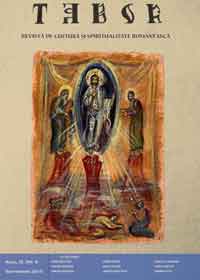
The text recalls the ‘60s, when, on a social and cultural level, Romania is relaxing and the restrictions of the communist regime are „melting down”. The „thaw” was started by Gheorghiu-Dej and boosted by Ceausescu. There was a lot of printing and reading. They allowed significant works of writers to be published, or high quality cultural shows to take place, and daily life was going on almost normally. The causes of this „thaw” are related to the political context of that time.
More...
One can observe as studying the political and intellectual debate on representing the Hungarian national minority in the Romanian state, that already in the interwar period there had been the elements of a plural debate, several models, different perspectives and political agendas entering the public scenery, which was still trying to survive in the times of the establishment of the Communist regime. After the consolidation of the new regime, the political realities, the economic and social transformations, the opportunities and restrictive dimensions as well, all had been the results of the political inputs of a single party-state, aiming the entire society as a whole. The first part of the present study is dedicated to the specific way of political integrating of the Hungarian etno-cultural community in the Romanian state, after 1944 and up to 1960’s, a period of time that was marked also by accumulating specific experiences, that defined the Hungarian elites’ perspective upon the community’s vital interest. The second part is dedicated to the defining moment of 1968 and its impact upon the Hungarian intellectuals’ own perspective over the realities they had to meet by their public agenda. The third part is an analysis of the two different pannels of interaction between the Romanian socialist state and the Hungarian intellectuals who tried to present the options and outcries of their community in the years between 1969- 1989: on one hand, it was aimed to influence the political regime’s decision making centre through the acting of Hungarian personalities integrated in those cadres of the regime; on the other hand, one have to address also the protest groups, the phenomena of intellectual resistance, expressed also in the samizdat publications edited in Romania between 1982-1989, in Hungarian language. The above mentioned pannels of interaction had influenced also the perspective of the immediate post-1989 elites upon the solutions for the problem of integrating the Hungarian minority in the new Romanian political reality.
More...
At a first glance, the Good Friday Agreement of 1998 erased all social, political, and economic differences between the Protestants and Catholics in Northern Ireland. Instead of growing together as one community, however, young unionists in particular have developed a strong sense of their particular socio-cultural identity which leads to recurring outbreaks of violence. The changing attitudes to the peace process by unionists’ will be outlined in this paper, followed by a closer look at unionist identities and their construction, in particular the minority aspect and the differences in identity between the generations. The underlying question is whether the Good Friday Agreement really helped to ease the tension between the communities – or has its approach to appease everyone created an identity group which suddenly feels more disadvantaged than ever?
More...
The word “crisis” (appearing in various forms due to the multi-lingual nature of the age) turns up quite often in texts written at the end of the 18th and the beginning of the 19th century. This poses a couple of questions to the historians of the era. The paper attempts to show how the concept of crisis was used at the turn of the century, and looks for examples of phenomena that can be interpreted along these concepts of crisis. The concept of crisis had had quite tangible meanings ever since antiquity, but in the 18th century it was gradually transformed first into a social-political and then into more of an economic concept. This transformation process can also be observed in the Hungary of the time. The dilemmas of the usage of the concept are apparent until the middle of the 19th century in texts related to medicine, literary criticism and later to politics. Looking at the translations of the era, we can also observe that the word did not have a well-defined meaning in contemporary Hungarian, its conceptual boundaries were not sharp, and coexistent word forms were continuously competing with each other. In the end, “crisis” gradually lost its original meaning, and the Latin form was slowly replaced by the Hungarian term “válság” (depression). In connection with the temporalization of certain social concepts, it gradually spread from the areas of medicine (and literary criticism) to the areas of politics and society as well as to economy, in many cases following a certain cyclicism. But defining the concept of depression and formulating a “tipology of depression” is a difficult task: probably scholars themselves need to define the concept of depression with which they plan to work in a historical perspective, when discussing either economic, social or mental historical questions.
More...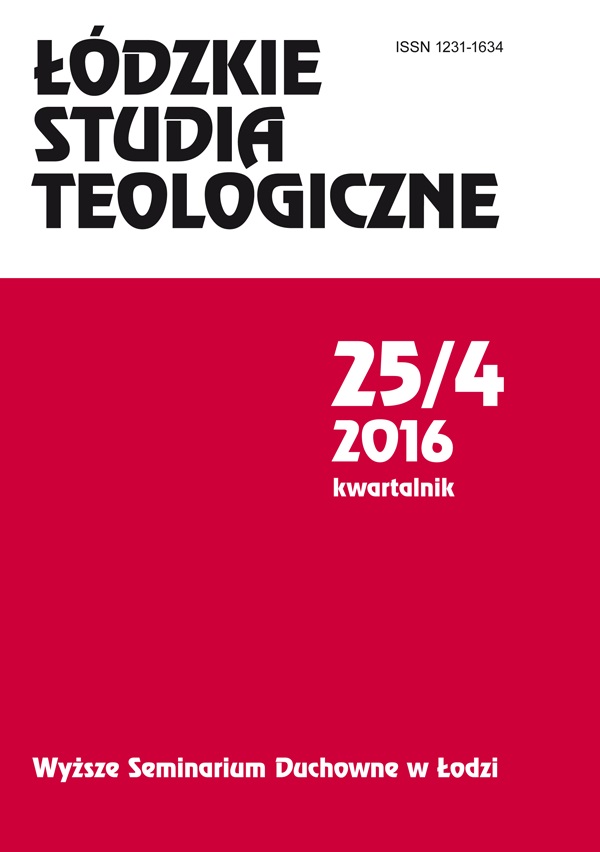
John Paul II mentioned that Martin Luther’s proclamation gave rise to the reformation and becamethe cause of breakages and divisions in the Church, but (despite everything) “the belief in the Crucifiedand Resurrected Christ remains as a common denominator of Christians of the reformation times. Theydiffered in relation to the Church and Rome but they did not reject the truth about the Resurrection”. This truth particularly characterized the actions of people on the Polish political scene inthe Jagiellonian period. This truth even now unites Christians and Christians who act together standa chance to demonstrate to the contemporary world that evil can and should be overcome by good butthey must, like Elijah, conquer disappointment and despair and to hear God’s command: “Get up, eatas there is a long way ahead of you”. Catholics and Protestants have already overcome many obstacles on their way to reconciliationbut perhaps the tradition of Polish Christianity, its Jagiellonian dimension will point out new areas of dialogue.
More...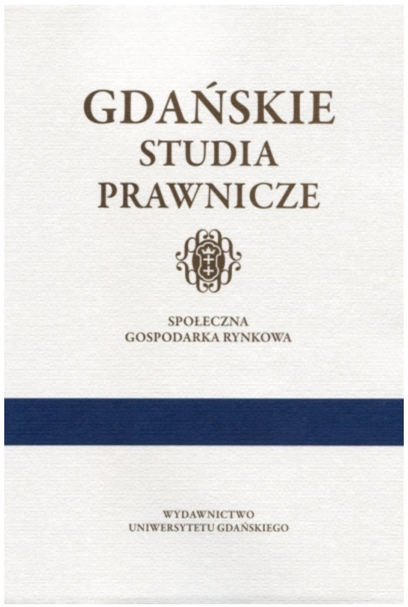
In the inter-war period in Poland the honor was one of the greatest values possessed by a man, a socio-professional group or even a nation. In order to preserve it, certain rules were respected, which created a kind of the catalog of customs broadly accepted in the society. Their violations had different consequences such as injury which was a result of losing a duel of honor, convict-ion by a court or exclusion from a certain social group. During that time, in the Second Republic of Poland, the restored parliament provided deputies and senators with immunity, which caused that they were ,,suspended” in the ability of honor — they could not be asked for any form of honor compensation (except for the insult of honor among parliamentarians themselves). The article presents the impact of parliamentary immunity on the parliamentarians’ability of honor from the legal, customary and moral points of view (the latter ones are presented on the basis of selected examples, which were described in numerous press articles). Particular attention was paid to the officers, for whom the integrity of honor was even a priority by virtue of their profession. While sitting in the benches of the Sejm and the Senate they sometimes forgot that, which aroused the resentment in the officer corps.
More...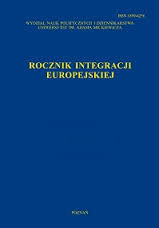
In the article I have analyzed France’s politics to the problem of Germany’s reunification. After world war II France wanted to keep a good relationship with the Federal Republic of Germany and the German Democratic Republic. French politicians presented a series of prerequisites of Germany’s reunification emphasizing, that the reunification should result from an agreement between both German countries and with approval of their neighboring countries.The French presidents: Charles de Gaulle, Georges Pompidou, Valery Giscard d’Estaing and François Mitterrand wanted to implement the policy of tenir le range in the relationship with Germany.
More...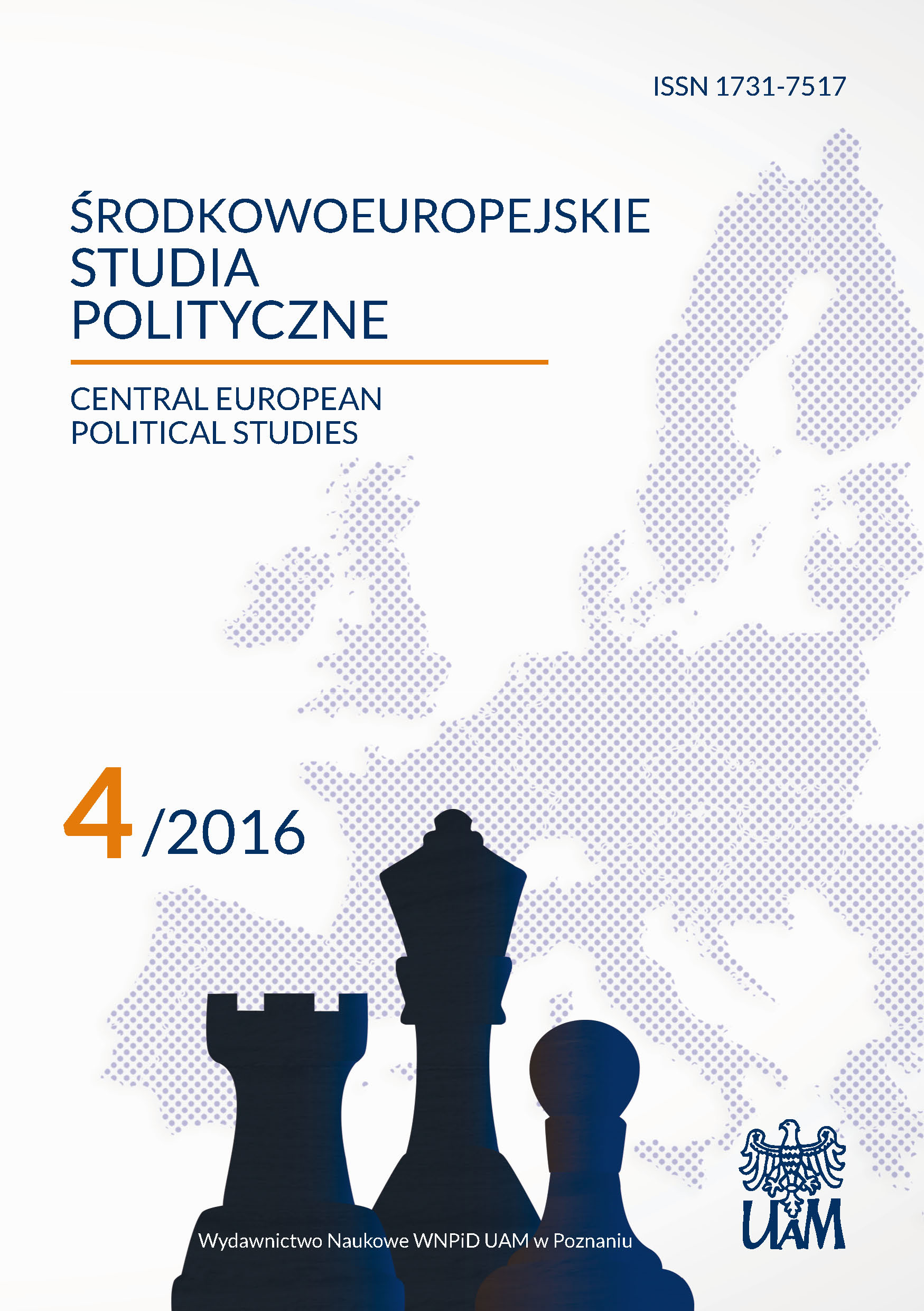
The author characterizes the examples of periodicals published by the Patriotic Movement for National Rebirth (PRON) in the then Poznań Region from 1983 to 1989. The following monthlies were among them: “Echa Opalenickie” (1983–1989),“Głos Śremski” (1984–1989), “Kórniczanin” (1988–1989), “Wiadomości Grodziskie” (1986–1989), “Wiadomości Nowotomyskie” (1986–1989), and a bi-monthly“Ziemia Szamotulska” (1988–1989). The author presents their founders, tasks and content as well as selected authors of materials published.
More...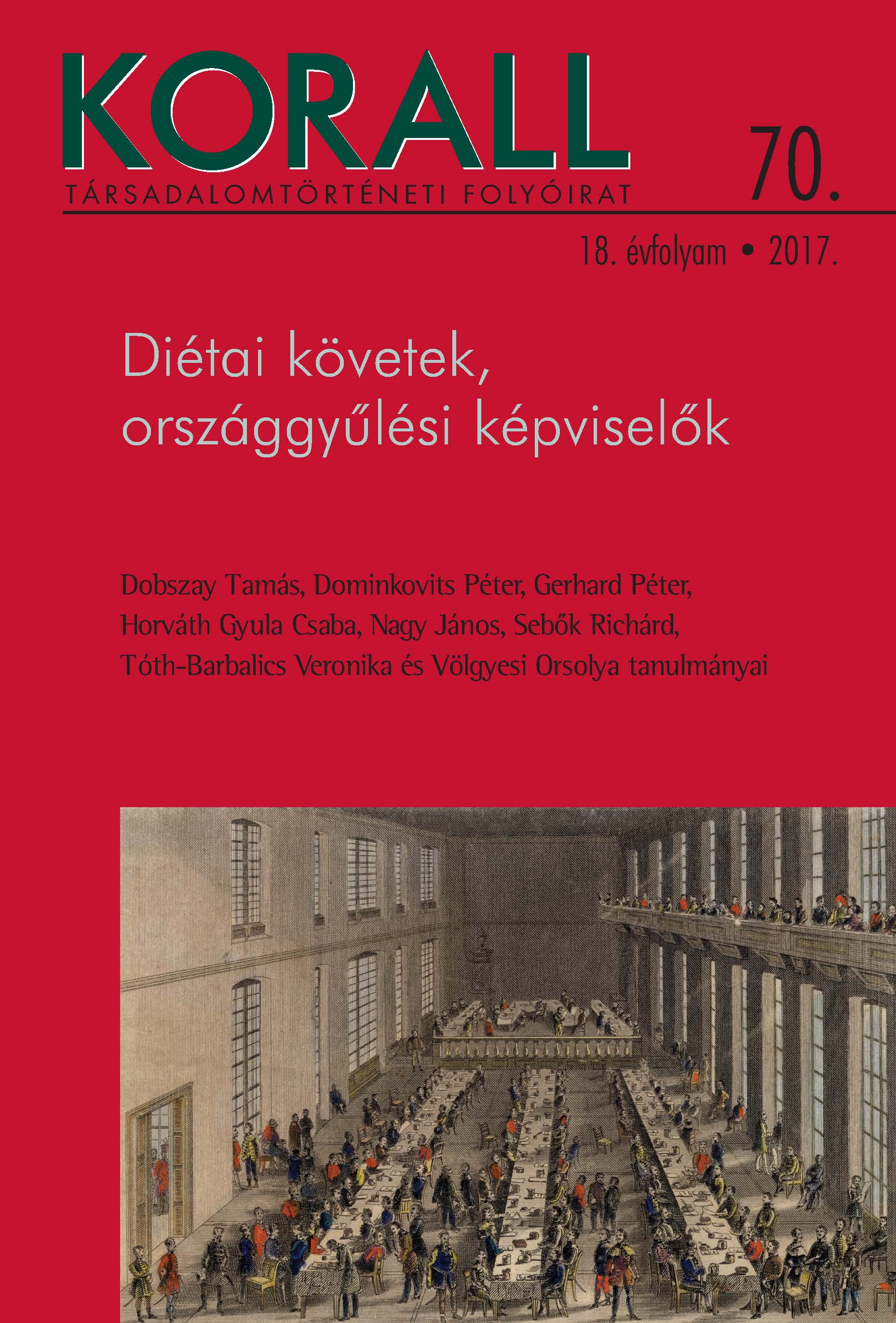
Town representatives played a marginal role in the eighteenth-century history of Hungarian diets. Relevant literature usually notes both their limited leverage and their loyalty to the government in general. The present inquiry probes deeper by studying in detail the activities of the representatives of Buda at the 1741 assembly as recorded in the correspondence between the city council, the representatives themselves, and the town’s agents in Vienna, as well as the diet records kept by the representatives. The main research questions include the demands and complaints put forward at the diet by the Buda representatives and how successful they were in resolving these during their stay in Pressburg/Pozsony (today Bratislava, Slovakia). Further, the author explores the various methods deployed to assert town interests and demonstrates the representatives’ “lobbying” at the diet and beyond. The study reveals that by 1741 the city of Buda – despite the Ottoman rule and the devastation caused by the “Rákóczi uprising” – had fully regained its former privileges and power as (capital) city. The archival sources also shed light on the evolution of bills regarding free royal towns through a closer look at the motivation and political agenda of the towns in the assembly’s decision making process. The examination of the decision making mechanism revealed that in the course of the diet proceedings, the representatives of Buda attained a leading position as one of the free royal towns and managed to close the gap with Pressburg and Pest.
More...
Jens Ivo Engels: A korrupció története: a korai újkortól a 20. századig.(Fordította: Kurdi Imre.) Corvina, Budapest, 2016. 444 oldal.
More...
Dobszay Tamás – Forgó András – Ifj. Bertényi Iván – Pálffy Géza – Rácz György – Szijártó M. István (szerk.): Rendiség és parlamentarizmus Magyarországon. A kezdetektől 1918-ig.*Argumentum Kiadó–Országgyűlés Hivatala, Budapest, 2013. 458 oldal.
More...
Pap József: Tanulmányok a dualizmus kori magyar parlamentarizmus történetéből.(Az Eszterházy Károly Főiskola Történelemtudományi Doktori Iskolája közleményei 5.) Akadémiai Kiadó–Líceum Kiadó, Budapest–Eger, 2014. 385 oldal.
More...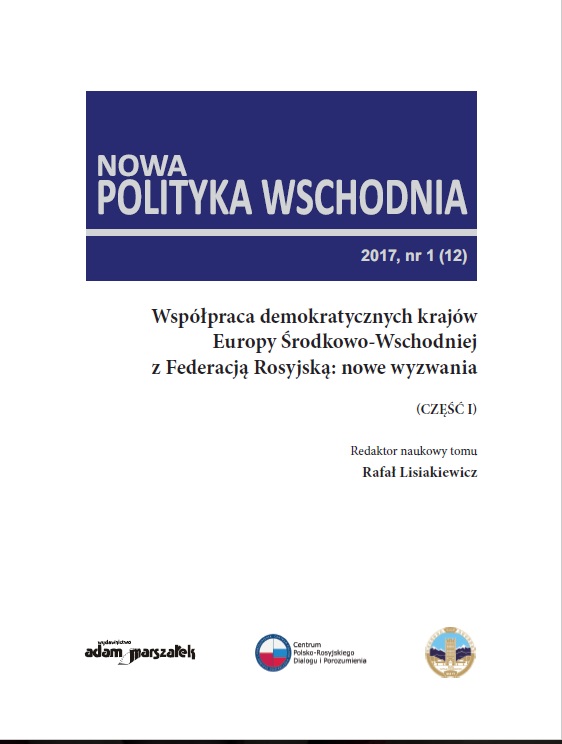
The Third Reich’s attack on Poland on September 1, and the Soviet Union’s on September 17, 1939 – without declaring of war – was another attempt to erase the Pol ish state from the map of Europe. Both the invaders justified their actions, with persecution of national minorities by Polish authorities. Under the German-Soviet agreement of September 28, 1939, the Polish lands were divided between the two states as a part of a secret protocol to the non-aggression treaty between Berlin and Moscow (23 August 1939), known as the Ribbentrop–Molotov Pact. Both totalitarian ideological systems: Stalinism and Nazism began to execute extermination policy against the citizens of the Republic of Poland. This policy was aimed at destroying the leadership layers of the nation, separation from national culture and tradition (in the case of Poles, also from the Roman Catholic religion) and transforming into Knechte, a cheap working-class – in the case of Germans, and a free labour force – in the case of Soviet Union. One of the basic instruments in the implementation of anti-Polish policy was an unprecedented on such a scale forced displacement of the population. As far as Germany is concerned, so far no such manifestations of anti-Polish policy has ever taken place. During the reign of the Hohenzollern (until November 28, 1918), ethnic assimilation was accomplished by the Germanisation of the population, while in Nazi rule (starting January 30, 1933) it was decided to demote the land and ISSN 2084-3291Nowa Polityka Wschodnia 2017, nr 3 (14) 146 Art ykuły HistoriA to displace or to murder the population. In total, during the occupied of Poland, about 1.71 million Polish citizens have been displaced by the German authorities, more than 3 million Jews were killing, as well as 0.5 a million ethnic Poles and more than 20,000 Gypsies.
More...